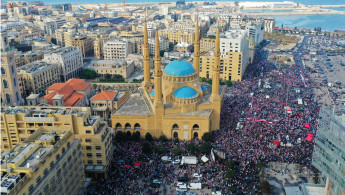Demonstrations began spontaneously on Thursday in response to a proposed tax on calls via WhatsApp and other messaging services.
While the government quickly dropped the plans, the protests morphed into demands for a sweeping overhaul of Lebanon's political system, with grievances ranging from austerity measures to poor infrastructure.
More than a quarter of Lebanon's population lives below the poverty line, according to the World Bank, while the country's political class has remained relatively unchanged since the end of a devastating 15-year civil war in 1990.
Sunday saw street rallies swell again, with thousands streaming into central Beirut and other locations throughout the country, many chanting "revolution" or "the people demand the fall of the regime" - a common slogan of demonstrations in other parts of the Arab world.
"I am demonstrating here to bring down the president's men and his corrupt government," Sanaa Mallah, 40, said in downtown Beirut. "I have a lot of hope in this movement."
Read more: Weddings, DJs and Baby Shark: Top five iconic moments from Lebanon's protests
Beleaguered Prime Minister Saad Hariri set a Monday night deadline for coalition partners to back reforms, but the four ministers of the Maronite Christian Lebanese Forces party resigned on Saturday evening.
Lebanon ranked 138 out of 180 in Transparency International's 2018 corruption index, while citizens suffer chronic electricity and water shortages.
Deadline under fire
Lebanon's political system was set up to balance power between the country's religious sects, including Christians, Sunni Muslims, Shia Muslims and Druze.
What some have dubbed the "WhatsApp revolution" has support from wide swathes of Lebanese society.
The protests have been mostly good-natured, with people singing or launching into traditional dabke dances, while others play cards and smoke shisha.
In Tripoli, Lebanon's traditionally conservative second city, the protests at points looked like a music festival on Saturday evening, with a DJ pumping out dance music from loudspeakers.
But while the demonstrators are largely united on what they oppose - with many condemning the entire political class as thieves and criminals - they so far lack a clear set of demands.
Speaking on Friday, Hariri did not say what would happen if the government did not back key reforms by Monday night, with the 72-hour deadline widely mocked among protestors and on social media.
Scuppering Hariri's unity call, Lebanese Forces head Samir Geagea, announced late on Saturday that the party's four ministers were quitting the government.
"We are now convinced that the government is unable to take the necessary steps to save the situation," Geagea said.
Other members of the government, including Shia movement Hezbollah, oppose the government's resignation.
'Thieves'
Demonstrators hailed Geagea's announcement but demanded more wholesale change.
Zalfa Aboukais, 27, was hanging signs bearing the names of lawmakers and ministers on barbed wire near parliament and the seat of government, saying they were all "thieves".
Originally from south Lebanon, she said she was protesting "against the hooligans who have been in power for 30 years".
Dani Mourtada said the country was waking up to reject entrenched sectarian divisions.
"We no longer want people to beg for legitimate rights and services that the state is supposed to provide," the 26-year-old protester said.
Lebanon is one of the world's most indebted countries, with a deficit of around $86 billion - more than 150 percent of gross domestic product - according to the finance ministry.
Public anger surged after parliament passed an austerity budget in July as part of efforts to make reforms that are essential if Lebanon is to unlock over $11 billion in economic assistance pledged by international donors last year.
Growth has plummeted in recent years, with political deadlock compounded by the impact of eight years of war in neighbouring Syria.
Follow us on Twitter: @The_NewArab





 Follow the Middle East's top stories in English at The New Arab on Google News
Follow the Middle East's top stories in English at The New Arab on Google News


